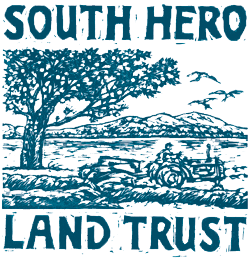Bringing Stories of Black, Indigenous, and People of Color to the Classroom: Farms, Food, and Nature to Become Lenses for Exploring Anti-racism
Asking Hard Questions
Over the last year the staff and board at South Hero Land Trust have been asking some difficult questions. What role are we, as a land conservation organization, playing in upholding racist policies and systems? And what role can we play in dismantling those policies and systems? How are we acting as gatekeepers to public land and land in general? How can we work actively to ensure that Black, Indigenous, and People of Color have access to and feel welcome on our trails, beaches, parks? How can we ensure that farmers of color have access to farmland in our community? And how can we lift up the stories and experiences of Black, Indigenous, and People of Color on the land and in our community so that we all feel seen, heard, and celebrated for who we are?
From Learning to Action
You may have read about the learning journey we have undertaken, and you may have joined us for one of our Winter Wednesday events with the Worthen Library. I feel incredibly grateful to our speakers and panelists, who so generously and bravely shared their stories and experiences with us—both the beautiful and the hard. While we still have a lot to learn as a white-led organization, we are also committed to taking action. This is why we are thrilled to have received funding from the Vermont Agency of Agriculture, Food, and Markets for a two year project with Folsom Educational and Community Center.
The focus of this project is exploring the integration of anti-racist education with our Farm to School and nature-based programs at the school. Using the lenses of storytelling, art, music, agriculture, food, and land stewardship, students and teachers will engage with the stories and experiences of Black, Indigenous, and People of Color in Vermont.
Additionally, we will be assessing and overhauling our own library of resources and farm to school lesson plans, field trip outlines, garden lessons, service projects, etc. to include voices and perspectives of BIPOC in our communities.
Two Folsom students eating ground cherries for the first time during the fall 2021 afterschool food and farm club with SHLT
On the path towards healing
One way we have already begun this work is through participating in the Abenaki Land Link Project, a partnership between the Nulhegan Band of the Coosuk Abenaki Nation, and the Northeast Organic Farming Association of Vermont (NOFA-VT). The project started in 2020 when 15 Vermont growers were given seeds of traditional Abenaki crop varieties such as Algonquin squash, Calias flint corn, true cranberry, skunk and Mohawk beans, among others. Each partner grew and harvested their crops, then returned them to the Nulhegan Band of the Coosuk Abenaki Nation. They in turn distribute it to Abenaki tribal members, especially to elders, those with disabilities, and those who are food insecure. They also collecting the seeds, to ensure these varieties don't go extinct.
In 2021, the project now has 40 growers, including South Hero Land Trust/Folsom School. This spring, Folsom students in the 3rd and 4th grade sowed a packet of true Abenaki cranberry beans, while also learning about the history and importance of these and other traditional foods.
Abenaki ‘true’ cranberry beans growing in the Folsom Learning Garden as part of the Abenaki Land link Project.
During a recent event organized by NOFA to celebrate the 2nd year of the project, Chief Don Stevens of the Nulhegan Band of the Coosuk Abenaki Nation addressed the crowd, saying he doesn't view this project as a charity, but a way to reconcile the past injustices done to the Abenaki and other native peoples, who have survived despite wars, disease, theft of land, familial separation, and the eugenics movement. He then told the story of how the first European settlers were starving, until the Wampanaog taught them how to grow native crops such as corn, beans, and squash. So, this project, explained Chief Don, is a way for the descendants of the settlers to show gratitude for that gift, and start the process of reconciliation.
In the first week of October, students came back to the Folsom Learning Garden to harvest two large buckets of beans they'd planted earlier this year, dried and ready to give back to the Abenaki people. Now, just as these crops will nourish Abenaki people through the winter, they will also provide a gateway to help us begin this process of healing through education, connection, and partnership with the Black, Indigenous and People of Color who have been too often left out of the story of food and farms in Vermont.
We are looking forward to more to come! Those curious to learn more about the Abenaki Land Link Program can go here for a storymap of the project created by VT Farm to Plate.


